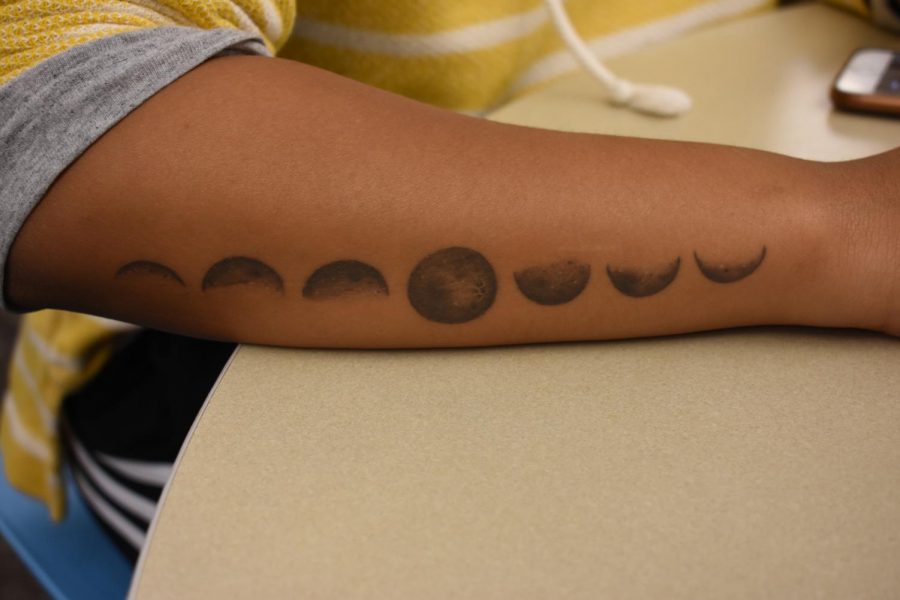Students see tattoos as art
Tattoos are a means of expression for students like Aberina Scrivner, a first-year sports medicine student.
November 1, 2019
Most people who look at the pine tree tattooed onto the left side of Cali Corona’s rib cage see a simple, black tree. Corona, a second-year finance student, says she sees a symbol of strength and beauty.
The year-old tattoo reminds her to “stay strong and grow from what has happened in the past,” says Corona, who suffers from panic attacks and depression and says that is “the main reason I got it.”
She says she wanted the permanent image close to her heart.
Once associated with drug and alcohol use, gangs and violence, tattoos have become mainstream.
A Pew Research Center study reveals that about 38 percent of 18- to 29-year-olds have at least one tattoo. And a report published in the journal “Human Relations” says tattooed job applicants are no less likely to get hired than those without inked skin.
Still, tattooed students told Campus Current they sometimes hide their body art, especially when they’re at work.
Second-year transfer studies student Abby Roy says although she wants to embrace her tattoo, she also stays mindful of future jobs.
“I know that some jobs don’t allow tattoos,” Roy says. “And to me, I think it’s professional not to show tattoos. So I want to try and keep tattoos where they can’t be easily seen.”
She has a tattoo of a lightbulb that spells “hope” on her inner left arm.
“When I’m feeling lost in life or confused, I like to look at it to remind myself that everything will work out,” Roy said. “You just have to hold onto hope.”
Annapolis tattoo artist Joe Nasatka says he cautions his clients to take care with the placement of what some refer to as “job blockers.”
“[I] try to steer people away from tattoos on areas like the face and hands that aren’t as easily concealed,” says Nasatka, who works at Orange Tattoo Co. “[I wait] until someone has spent time collecting [tattoos] and covering other areas.”
Corona says she keeps her tattoo hidden from her parents, but she doesn’t worry about showing it to employers and the rest of the public.
“Your tattoos should not affect your employment,” Corona says. “Thankfully, I haven’t had any issues with it [and] my co-workers haven’t had any issues with it. So it shouldn’t be a problem in the future because [I think] people will become more accepting of tattoos and having them shown.”
Armando Martinez, a second-year architecture student, agrees.
He said being in the design field makes him comfortable with expressing his creativity through his tattoos.
“Other than my name, which is pretty memorable in people’s heads, I feel like my tattoos often [make me memorable],” Martinez says.
He got his first tattoo—his birthdate in Roman numerals on his left wrist—the day he turned 18.
As soon as he got it, he wanted more, Martinez says.
Now he has a four-leaf clover tattoo on the top of his right ear and a diagram of a pig on his right forearm.
“The clover means, to me, that just because you can doesn’t always mean you should,” Martinez says. “Not that I regret my tattoo, but it’s just a general life lesson. As far as my pig tattoo, I was in culinary school at the time and I thought it would be so cool.”
Martinez says the support of his family made him feel comfortable with embracing his tattoos.
“During the mid-90s, my mother got a tattoo of my name on her arm,” Martinez says. “It was her child’s name and she was proud to present that. … Soon after I started getting tattoos, my dad decided, ‘Hey, I want one too.’ My grandmother even has one that she got in her 60s.”
Martinez says his father has a tattoo of the Superman symbol on his leg because his coworkers and family always referred to him as a hero.
His grandmother has a henna-style elephant on her upper right arm because of her love for the animal.
Having tattoos is “something that [our family] cherishes,” he says.
Martinez says nobody should feel afraid to show off tattoos, and people should see them as art rather than scars to the body.
“My tattoos make me stand out more,” Martinez says. “I work at a firm and people say, ‘Oh, it’s the gentleman with the clover tattoo on his ear,’ and I honestly love that.”
Martinez says his tattoos shouldn’t affect future employment opportunities because they don’t affect his work ethic.
“In the way I present myself in a job opportunity, I really hold myself in a professional manner,” Martinez says. “I think that stands out more to employers than my tattoos.”
Nasatka says most of the college-age students he inks come in mentally prepared to get their tattoos and feel set on their designs.
“Most come in with a clear direction and meaning behind their first [tattoo],” Nasatka says. “Because of that, they tend not to regret their decision.”
Corona says although she planned her design for five years, it was her parents’ dislike of tattoos that made her hesitate to get one.
“My parents don’t even know I have it,” Corona says. “They don’t really understand what happened to me when I was younger, so I don’t think they would be understanding as to what this tattoo means to me.”
She says she fell in love with one of her friends’ tattoos and knew she wanted the same artist to do hers.
“[This artist] had availability one day and he reached out to me to see if I could come in,” Corona says. “I said, ‘Yes of course I’ll come; I have been wanting this forever.’ … It was definitely unexpected, but when I got it, it was such a refreshing moment for me.”












